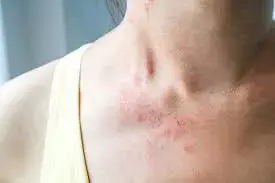- Home
- Medical news & Guidelines
- Anesthesiology
- Cardiology and CTVS
- Critical Care
- Dentistry
- Dermatology
- Diabetes and Endocrinology
- ENT
- Gastroenterology
- Medicine
- Nephrology
- Neurology
- Obstretics-Gynaecology
- Oncology
- Ophthalmology
- Orthopaedics
- Pediatrics-Neonatology
- Psychiatry
- Pulmonology
- Radiology
- Surgery
- Urology
- Laboratory Medicine
- Diet
- Nursing
- Paramedical
- Physiotherapy
- Health news
- Fact Check
- Bone Health Fact Check
- Brain Health Fact Check
- Cancer Related Fact Check
- Child Care Fact Check
- Dental and oral health fact check
- Diabetes and metabolic health fact check
- Diet and Nutrition Fact Check
- Eye and ENT Care Fact Check
- Fitness fact check
- Gut health fact check
- Heart health fact check
- Kidney health fact check
- Medical education fact check
- Men's health fact check
- Respiratory fact check
- Skin and hair care fact check
- Vaccine and Immunization fact check
- Women's health fact check
- AYUSH
- State News
- Andaman and Nicobar Islands
- Andhra Pradesh
- Arunachal Pradesh
- Assam
- Bihar
- Chandigarh
- Chattisgarh
- Dadra and Nagar Haveli
- Daman and Diu
- Delhi
- Goa
- Gujarat
- Haryana
- Himachal Pradesh
- Jammu & Kashmir
- Jharkhand
- Karnataka
- Kerala
- Ladakh
- Lakshadweep
- Madhya Pradesh
- Maharashtra
- Manipur
- Meghalaya
- Mizoram
- Nagaland
- Odisha
- Puducherry
- Punjab
- Rajasthan
- Sikkim
- Tamil Nadu
- Telangana
- Tripura
- Uttar Pradesh
- Uttrakhand
- West Bengal
- Medical Education
- Industry
Undifferentiated Pruritus Associated with Increased Risk of Hematologic Cancer

According to a recent study published in the JAMA Dermatology, undifferentiated Pruritus is Associated with an Increased Risk of Hematologic Cancer.
Although pruritus is common in patients with hematologic cancers, it is unknown whether patients with undifferentiated pruritus have a higher risk of developing hematologic cancer. Furthermore, it is unclear whether serum lactate dehydrogenase (LDH) level, commonly ordered for cancer workup, has diagnostic utility in patients with pruritus. A study was conducted to assess the risk of hematologic cancer and the diagnostic utility of LDH levels in patients with undifferentiated pruritus.
This retrospective population-level cohort analysis was conducted using the TriNetX Research Network, a global health records database encompassing more than 69 million patients, from 2002 to 2020. The study included 327 502 eligible patients diagnosed with unspecified pruritus, excluding those with existing chronic pruritic dermatoses or systemic diseases are known to cause pruritus, and 327 502 matched controls.
Results:
After matching, the pruritus and control cohorts each had 327 502 patients (68.1% female patients; 0.4% American Indian or Alaska Native patients; 3.5% Asian patients; 22.2% Black patients; 0.1% Native Hawaiian or Pacific Islander patients; 59.3% White patients; mean [SD] age, 42.2 [22] years). Patients with pruritus had increased 1-year risk of Hodgkin lymphoma (RR, 4.42; 95% CI, 2.83-6.88), myeloid leukemia (RR, 2.56; 95% CI, 1.79-3.67), multiple myeloma (RR, 2.38; 95% CI, 1.66-3.41), non-Hodgkin lymphoma (RR, 2.35; 95% CI, 1.96-2.82), monoclonal gammopathy (RR, 1.90; 95% CI, 1.55-2.32), myelodysplastic syndrome (RR, 1.74; 95% CI, 1.14-2.64), and lymphocytic leukemia (RR, 1.47; 95% CI, 1.07-2.02). After 12 months, the cancer risk was comparable with that of controls. Patients with pruritus had increased LDH levels, which were not associated with increased hematologic cancer risk.
In this cohort study, the RR of hematologic cancer in patients with undifferentiated pruritus was highest in the first 12 months, and LDH level had limited diagnostic utility in these patients. Clinicians should consider a thorough review of symptoms and assessment of cancer risk factors when deciding on workup for patients presenting with undifferentiated pruritus.
Reference:
Risk of Hematologic Cancer in Patients with Undifferentiated Pruritus by Junwen Deng et al. published in the JAMA Dermatology.
doi:10.1001/jamadermatol.2022.1562
Keywords:
Risk, Hematologic Cancer, Patients, Undifferentiated, Pruritus, Junwen Deng, Varsha Parthasarathy, Waleed Adawi, Zachary Bordeaux, Nishadh Sutaria, Abhishek Gami, BS1; Matthew Taylor, Kevin K. Lee, Melika Marani, Isabelle Brown, Anusha Kambala, BS1; Hannah L. Cornman, Ali Alajmi, Thomas Pritchard, Olusola O. Oladipo, Yevgeniy R. Semenov, MD2; Shawn G. Kwatra, JAMA Dermatol
Dr. Shravani Dali has completed her BDS from Pravara institute of medical sciences, loni. Following which she extensively worked in the healthcare sector for 2+ years. She has been actively involved in writing blogs in field of health and wellness. Currently she is pursuing her Masters of public health-health administration from Tata institute of social sciences. She can be contacted at editorial@medicaldialogues.in.
Dr Kamal Kant Kohli-MBBS, DTCD- a chest specialist with more than 30 years of practice and a flair for writing clinical articles, Dr Kamal Kant Kohli joined Medical Dialogues as a Chief Editor of Medical News. Besides writing articles, as an editor, he proofreads and verifies all the medical content published on Medical Dialogues including those coming from journals, studies,medical conferences,guidelines etc. Email: drkohli@medicaldialogues.in. Contact no. 011-43720751


